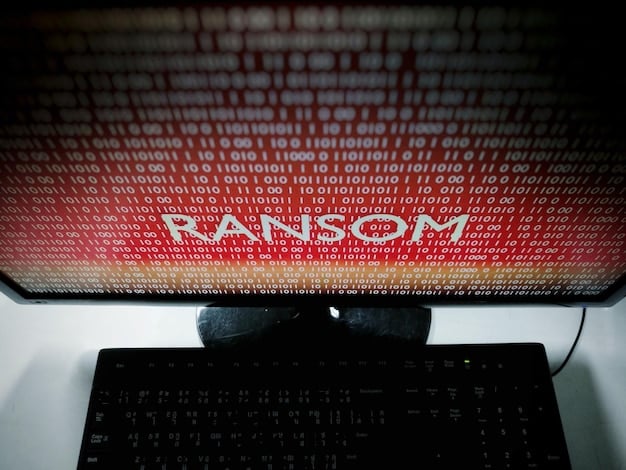Data Breach at Game Studio: Impact on Consumer Trust & US Laws

A recent data breach alert: how the recent hack of a major game studio could affect consumer trust and data privacy laws in the US poses significant risks to consumer data, demanding a reevaluation of data protection strategies.
The gaming industry faces a critical moment as a major game studio has recently suffered a significant data breach alert: how the recent hack of a major game studio could affect consumer trust and data privacy laws in the US. This incident raises serious concerns about the security of user data and the potential legal ramifications under US data privacy regulations.
Understanding the Scope of the Data Breach
The recent hack of a major game studio has sent ripples throughout the gaming community and the broader tech industry. It’s essential to understand the extent of the breach to fully appreciate its potential impact. What data was compromised, and how many users are potentially affected?
What Information Was Compromised?
Data breaches can expose a wide range of sensitive information, depending on the security measures in place and the intentions of the attackers. Understanding what types of data were accessed is crucial for assessing the severity of the breach.
- Personal Identifiable Information (PII): This includes names, addresses, email addresses, phone numbers, and dates of birth.
- Financial Data: Credit card numbers, bank account details, and transaction histories are highly valuable to cybercriminals.
- Account Credentials: Usernames, passwords, security questions, and authentication tokens can be used to access user accounts.
- Game-Related Data: In-game purchases, character information, game progress, and chat logs may also be compromised.

How Many Users Are Affected?
The number of affected users can range from a few thousand to millions, depending on the size of the game studio and the popularity of its games. A large-scale breach can have a devastating impact on consumer trust and the company’s reputation.
The initial assessment typically involves analyzing the compromised data and cross-referencing it with user databases. However, the full extent of the breach may not be immediately apparent.
In conclusion, understanding the scope of a data breach involves identifying the types of compromised data and estimating the number of affected users. This information is crucial for taking appropriate steps to mitigate the damage and prevent future incidents.
The Immediate Impact on Consumer Trust
A data breach can severely erode consumer trust in a game studio and the broader gaming industry. Gamers entrust companies with their personal and financial information, expecting them to keep it safe. When that trust is broken, the consequences can be far-reaching.
Loss of Confidence in Data Security
Consumers who have had their data exposed in a breach often lose confidence in the company’s ability to protect their information. This can lead to a decline in user engagement and a reluctance to make future purchases.
Reputational Damage to the Game Studio
A data breach can tarnish a game studio’s reputation, making it difficult to attract new users and retain existing ones. Negative media coverage and social media backlash can amplify the damage.
- Public Relations Crisis: Companies must manage public perception through transparent communication and decisive action.
- Brand Image Erosion: A tarnished reputation can lead to a decline in brand value and market share.
- Long-Term Impact: Regaining consumer trust can take years, requiring sustained efforts to improve security and transparency.
Potential for Class Action Lawsuits
Affected consumers may file class-action lawsuits against the game studio, seeking compensation for damages resulting from the breach. These lawsuits can be costly and time-consuming, further damaging the company’s reputation and financial stability.
In summary, the immediate impact on consumer trust can be severe, leading to a loss of confidence, reputational damage, and potential legal liabilities. It is essential for game studios to prioritize data security and take swift action in the event of a breach to mitigate the damage.
US Data Privacy Laws and Regulations
The United States has a complex landscape of data privacy laws and regulations, which can vary by state and industry. Understanding these laws is essential for game studios to ensure compliance and avoid legal penalties in the event of a data breach.
Key Federal Laws
Several federal laws address data privacy and security, including:
- The Federal Trade Commission Act (FTC Act): This law empowers the FTC to take action against companies that engage in unfair or deceptive practices related to data security.
- The Children’s Online Privacy Protection Act (COPPA): COPPA protects the online privacy of children under 13, requiring parental consent for the collection and use of their personal information.
- The Health Insurance Portability and Accountability Act (HIPAA): While primarily focused on healthcare, HIPAA establishes standards for the protection of sensitive health information.
State-Level Data Privacy Laws
Many states have enacted their own data privacy laws, which can be more stringent than federal regulations. Some key state laws include:
- The California Consumer Privacy Act (CCPA): CCPA grants California residents broad rights over their personal information, including the right to access, delete, and opt-out of the sale of their data.
- The New York SHIELD Act: The SHIELD Act requires companies that hold the private information of New York residents to implement reasonable data security measures.
- The Massachusetts Data Security Law: This law mandates that companies implement a written information security program to protect personal information.

Implications for Game Studios
Game studios must comply with all applicable federal and state data privacy laws, which can be a complex and challenging task. Failure to comply can result in significant fines, legal penalties, and reputational damage.
In conclusion, understanding the nuances of US data privacy laws and regulations is critical for game studios to protect consumer data and avoid legal liabilities. Companies must invest in robust data security measures and stay informed about evolving legal requirements.
Practical Steps for Game Studios to Enhance Data Security
To safeguard user data and maintain consumer trust, game studios must adopt proactive and comprehensive data security measures. These steps can help prevent data breaches and mitigate the impact of any incidents that do occur.
Implement Strong Encryption
Data encryption is the process of converting information into a coded format that can only be deciphered with a decryption key. Strong encryption can protect sensitive data both in transit and at rest.
Conduct Regular Security Audits
Security audits involve assessing the game studio’s data security practices and identifying any vulnerabilities. Regular audits can help detect and address potential weaknesses before they are exploited.
Employee Training Programs
Employee training programs can educate staff about data security best practices, such as recognizing phishing attempts and securely handling sensitive information. A well-trained workforce is a crucial line of defense against cyberattacks.
Incident Response Plan
An incident response plan outlines the steps to be taken in the event of a data breach. The plan should include procedures for containing the breach, notifying affected users, and restoring data security.
- Data Breach Notification Laws: These laws require companies to notify affected individuals when their personal information has been compromised.
- Federal Trade Commission (FTC): The FTC may take action against companies that fail to protect consumer data.
- State Attorneys General: State attorneys general can investigate data breaches and pursue legal action against companies that violate state laws.
By implementing these practical steps, game studios can significantly enhance their data security posture and protect user data. A proactive approach to data security is essential for maintaining consumer trust and avoiding legal liabilities.
The Role of Cybersecurity Insurance
Cybersecurity insurance can provide financial protection for game studios in the event of a data breach. These policies typically cover costs associated with data recovery, legal fees, and notification expenses.
Coverage Options and Benefits
Cybersecurity insurance policies can vary widely in terms of coverage and benefits. Some common features include:
- Data Breach Response Costs: Coverage for expenses related to investigating and responding to a data breach, such as forensic analysis, legal advice, and public relations services.
- Notification Expenses: Coverage for the costs of notifying affected users about the data breach, including mailing expenses and call center operations.
- Legal Defense and Liability Coverage: Coverage for legal fees and damages resulting from lawsuits related to the data breach.
Selecting the Right Policy
Choosing the right cybersecurity insurance policy requires careful consideration of the game studio’s specific needs and risks. Some key factors to consider include:
- Coverage Limits: The maximum amount that the policy will pay out for a covered loss.
- Deductibles: The amount that the game studio must pay out of pocket before the insurance coverage kicks in.
- Exclusions: Specific types of losses that are not covered by the policy.
Cybersecurity insurance can be a valuable tool for managing the financial risks associated with data breaches. However, it is important to carefully review the policy terms and conditions to ensure that it provides adequate coverage.
Data Breach Recovery and Aftermath
Recovering from a data breach requires a strategic and systematic approach to mitigate the damage, restore user trust, and prevent future incidents. This involves a combination of technical, legal, and communication strategies.
Immediate Steps Post-Breach
The immediate aftermath of a data breach is critical for containing the damage and initiating the recovery process. Key steps include:
- Incident Response Team Activation: Assemble a team of experts to manage the breach, including IT professionals, legal counsel, and public relations specialists.
- Containment of the Breach: Identify and isolate the source of the breach to prevent further data loss.
- Forensic Investigation: Conduct a thorough investigation to determine the scope of the breach, the types of data compromised, and the methods used by the attackers.
Communication with Stakeholders
Transparent and timely communication with stakeholders is essential for maintaining trust and managing the reputational impact of the breach. This involves:
- Notification to Affected Users: Inform users about the breach, the types of data compromised, and the steps they can take to protect themselves.
- Engagement with Media: Proactively address media inquiries and provide accurate information to the public.
- Collaboration with Authorities: Cooperate with law enforcement and regulatory agencies in their investigations.
In conclusion, recovering from a data breach requires a multifaceted approach that addresses technical, legal, and communication challenges. By taking swift and decisive action, game studios can minimize the damage and restore user trust.
| Key Point | Brief Description |
|---|---|
| 🛡️ Data Breach Scope | Understanding what data types were compromised, and number of users affected. |
| ⚖️ US Privacy Laws | Overview of key federal and state regulations like CCPA and FTC Act. |
| 🔒 Security Measures | Practical steps for game studios to enhance data security. |
| 💰 Cybersecurity Insurance | Benefits and coverage of cybersecurity insurance policies. |
FAQ
▼
Typically, compromised data includes PII, financial details, game-related data, and account credentials. Attackers target sensitive information to exploit users and gain unauthorized access.
▼
A data breach usually erodes consumer trust by making users lose confidence in the company’s ability to protect their data. This may lead to negative PR and potential lawsuits.
▼
Game studios should be aware of laws like the FTC Act, COPPA, CCPA, and the NY SHIELD Act to ensure compliance. These laws protect user data and prevent security breaches.
▼
Game studios can implement strong encryption. They must also conduct routine security audits. Further, they can set up employee training programs and come up with a detailed incident response plan.
▼
Cybersecurity insurance gives financial protection in the event of a data breach. It assists with response costs, legal fees, and notification expenses, helping companies to recover quickly.
Conclusion
In conclusion, the recent data breach at a major game studio serves as a stark reminder of the importance of data security in the gaming industry. By understanding the impact of these breaches, complying with data privacy laws, and implementing robust security measures, game studios can protect user data and maintain consumer trust.